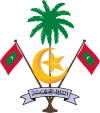Names of Maldives
Maldives has been known by many different names during its long history of more than two thousand years. Although several different names are given, the location and the description of the islands confirm the fact that it is the Maldives.
In ancient times Malé was also called "Mahal", considered to be the origin of "Mahal Dvipa" or "Maléldvip". Throughout known history, Malé or Mahal was always the most important island, the island where the king resided. It is therefore a logical assumption that the name given to the islands, Mahal Dvipa, contained a reference to the chief island of Mahal. A study of the names shows that in the 9th, 10th and 11th centuries, the original Mahal Dvipa became Arabicised by Middle Eastern travellers, to Mahaldib, and later became Anglicized by British Empire to emerge in its present form of Maldives. However, throughout history Maldivians have used the name "Dhivehi Raajje" to refer to their country, meaning "The Country of the Dhivehi People".[1]
List
Given below are some of the names by which Maldives was known through the centuries.
- The earliest known reference to Maldives is given in the Mahavansa, the ancient chronicle of the people of Sri Lanka, written in c.200 BC. In these records Maldives is referred to as "Mahinda-dvipa".
- About the fourth century AD, Palladius, Bishop of Hellenopolis (360-430 AD) a classical Greek bishop, refers to Maldives as "Maniolae", in his document "On the Races of the Indian and the Brahmans", adding that the magnet stone which attracts iron was produced in these islands.
- In ancient South Indian Pallava Dynasty inscriptions of the 7th century AD, Maldives were called "Dvipa Laksham" (a hundred thousand islands).
- Hiuen-Tsang, a Buddhist monk who travelled in India for religious studies in the years 629 to 645 AD, was the first Chinese writer to mention Maldives. He called the islands "Na-lo-ki-lo-chou" (coconut islands). =
- A Chinese document from the Tang Dynasty, records the visit of Maldivians to China bringing with them gifts from their king, Baladitiya in 658 AD and also in 662 AD. Maldives is referred to as "Mo-lai" in this document.
- In a 10th-century Tamil record of the Chola Dynasty, Maldives is given the name "Munnir Palantivu Pannirayiram" (twelve thousand islands and the ocean where three waters meet).
- Sulaiman was a Persian merchant and sea-captain who lived in the first half of the ninth century AD. His manuscripts describing his travels and the places he visited were found in France in the 1700s. In his description of Maldives, he gives them the name Dibajat. Al Biruni in the 11th century and Muhammad al-Idrisi in the 12th century AD, also referred to Maldives by the name of Dibajat.
- Abu Zayd, who lived in Iraq in the years 850 to 934 AD, writes of Maldives as "Dyvah Kouzah" (cowrie islands).
- In the Tamil commentary Tolkattiyam of the 13th century AD, Maldives is called "Palpalamtivu" (many old islands).
- A Chinese writer Wang Ta-Yuan, writing in 1349, gave the Maldives the name "Pei Liu". In 1414 AD, Zheng He the famous Chinese commander came to Maldives, bringing with him a scribe by the name of Ma Huan, to record their travels. In Ma Huan's records Maldives is called "Lu Shan Tieh-kan" (陆山)(the countries of the island mountains). In 1436 AD, another Chinese writer Fei Hsin called the islands, Lu Shan Yang (atolls of Maldives).
- The 13th century Kudahuvadhoo Loamaafaanu give Maldives name as "Panandheepu". The Bodugalu Miskiiy Loamaafaanu gives the same name as "Fanandheebu".
- Ibn Battuta who visited Maldives in 1343 and stayed for 18 months, and returned in 1346 AD, called the islands by the name, Dhibat Al Mahal.
- When the first Portuguese arrived in the East in the early 16th century, Maldives was referred to by them as "Ilha Dywe".
- In 1573 AD, when Muhammad Thakurufaanu Al-Azam became Sultan after the defeat of the Portuguese occupants, he gave Arabized the official name to "Al Daulat min al-Mahaldibiyat".
- In the late 18th and early 19th centuries, Maldives was called "Maldiva Islands" in many English records, but by the beginning of the 20th century, Maldives or Maldive Islands had become the commonly used name.
See also
References
- ↑ Xavier Romero-Frias, The Maldive Islanders, A Study of the Popular Culture of an Ancient Ocean Kingdom, Barcelona 1999, ISBN 84-7254-801-5
- National Center For Linguistics And Historical Research (Maldives Government Agency)
- This article incorporates text from the NCLHR publications, which are in the public domain.
